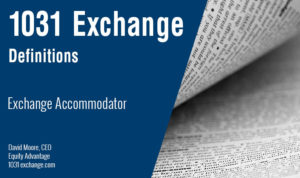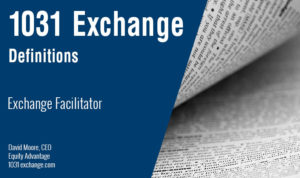David Moore from Equity Advantage shares exciting advanced 1031 Exchange strategies—the fun stuff! Learn from his wealth of knowledge how to navigate the complexities of real estate investing. Whether you’re a real estate professional, tax advisor, or investor, there are nuggets of wisdom here for you.
Why 1031 Exchanges Matter
Did you know that 1031 Exchanges can be applied to up to 64% of all real estate closings? Yet, nearly a century after their inception, many investors remain unaware of this powerful wealth-building tool. The 1031 Exchange isn’t merely a tax or legal decision—it’s an investment decision. It’s about getting out of what you don’t want and into what you do want.
Advanced Strategies to Consider
Let’s break down some of the more advanced options available to you:
- Reverse Exchanges: Buy first, sell later. This strategy can be particularly beneficial if you find the perfect property before selling your current one.
- Improvement Exchanges: You can improve the property you’re acquiring during the exchange process, which can significantly increase its value.
- Partnership Exchanges: A way to navigate exchanges involving partnerships, ensuring all parties benefit.
- Related Party Transactions: You can engage in exchanges with related parties, but both parties must hold their properties for at least two years.
Understanding Gain and Basis
It’s critical to understand the difference between gain and basis. Gain is simply the adjusted sales price minus the basis of the property. Your basis includes what you paid for the property plus capital improvements, minus depreciation. Many investors overlook how these factors influence their tax exposure.
The Importance of Planning
Planning is essential. You need to ask yourself where you want to be in two, five, or ten years. The old saying, “Those who fail to plan, plan to fail,” rings true here. If you’re not prepared, you might find yourself in a tough spot when it comes time to sell or exchange.
Phantom Gain: A Hidden Risk
Phantom gain occurs when you have debt over basis, particularly in short sales or foreclosures. This can lead to unexpected tax exposure, so it’s crucial to have a team of professionals—brokers, finance people, property managers, and tax advisors—working together to help you navigate these waters.
Utilizing Seller Carrybacks
Seller carrybacks can be a powerful tool. However, if you’re selling and carrying a note, ensure that you understand the potential tax consequences. You may face tax on debt relief and depreciation recapture, even if you haven’t received any principal payments yet.
Understanding Timelines
In a typical 1031 Exchange, you have 45 days to identify a replacement property and 180 days to close on it. If you miss these deadlines, you may lose the opportunity to defer your taxes, which is why early planning and communication with your tax advisors are crucial.
Combining Personal and Plan Money
It’s possible to combine personal funds with retirement accounts (like IRAs) in a 1031 Exchange. This can be done through a Tenancy in Common (TIC) structure, allowing you to leverage both types of funds effectively.
Real-Life Examples
Let’s look at some real-life scenarios where these strategies shine:
- A client exchanged a $3 million multifamily property for a $1 million desert home, saving a quarter million in taxes.
- Another investor utilized a reverse exchange to buy a rental property before selling their existing one, maximizing their investment opportunities.
- In a partnership scenario, members successfully executed a drop and swap strategy to facilitate their individual exchanges.
David’s Final Thoughts
As you consider your 1031 Exchange strategies, remember it’s not just about avoiding taxes—it’s about empowering your investments. Stay informed, leverage the resources available to you, and always consult with your tax professionals. If you have questions or want to learn more, don’t hesitate to reach out!
To stay up to date with our video content subscribe to our YouTube channel.
Whether looking for information on simple to complex 1031 issues, Cost Segregation, Life Insurance Contract Sales, DSTs or even Qualified Opportunity Zones you will find information on our channel.
The Guys With All The Answers…
 David and Thomas Moore, the co-founders of Equity Advantage & IRA Advantage
David and Thomas Moore, the co-founders of Equity Advantage & IRA Advantage
Whether working through a 1031 Exchange with Equity Advantage, acquiring real estate with an IRA through IRA Advantage or listing investment property through our Post 1031 property listing site, we are here to help Investors get where they want to be. Call them today! 503-635-1031.









